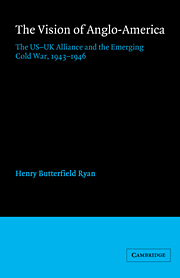Book contents
- Frontmatter
- Contents
- ACKNOWLEDGEMENTS
- INTRODUCTION
- PART I STRENGTHENING THE TIES: THE EFFORT AND THE PROBLEMS
- PART II FOREIGN CRISES THAT DEMONSTRATE GREAT BRITAIN'S PROBLEMS
- INTRODUCTION
- 5 Background and build-up
- 6 Involvement of Great Britain and the United States
- 7 Yalta and after
- 8 Truman: the new factor
- 9 The gathering for the San Francisco Conference
- 10 Between San Francisco and Potsdam
- 11 Concluding thoughts on the Polish crisis
- 12 Background of the crisis
- 13 1944, the critical year
- 14 The role of the press
- 15 The crisis peaks
- 16 America dives in
- CONCLUSION
- NOTES
- BIBLIOGRAPHY
- INDEX
10 - Between San Francisco and Potsdam
from PART II - FOREIGN CRISES THAT DEMONSTRATE GREAT BRITAIN'S PROBLEMS
Published online by Cambridge University Press: 07 December 2009
- Frontmatter
- Contents
- ACKNOWLEDGEMENTS
- INTRODUCTION
- PART I STRENGTHENING THE TIES: THE EFFORT AND THE PROBLEMS
- PART II FOREIGN CRISES THAT DEMONSTRATE GREAT BRITAIN'S PROBLEMS
- INTRODUCTION
- 5 Background and build-up
- 6 Involvement of Great Britain and the United States
- 7 Yalta and after
- 8 Truman: the new factor
- 9 The gathering for the San Francisco Conference
- 10 Between San Francisco and Potsdam
- 11 Concluding thoughts on the Polish crisis
- 12 Background of the crisis
- 13 1944, the critical year
- 14 The role of the press
- 15 The crisis peaks
- 16 America dives in
- CONCLUSION
- NOTES
- BIBLIOGRAPHY
- INDEX
Summary
The American Administration seemed determined to have the issue of Poland's government solved before the Potsdam Meeting, scheduled for mid-July, and was much more willing than its British counterpart to make concessions to this end. Although there may have been little Churchill could do to slow the process, his efforts to ‘stiffen’ the US Government nevertheless reached a peak in the two-month period from mid-May to mid-July. Besides Poland, the issues on which he was prodding his American ally included Trieste, or more accurately the province of Venezia Giulia, and the eastward positioning of US and British troops.
In the latter part of May, however, his campaign received a damaging blow when he learned that Truman might meet alone with Stalin before the next Big Three meeting. The idea was put to Churchill by Joseph Davies, a former US ambassador to the Soviet Union, and drew a powerful reaction, i.e., if Stalin and Truman met without him, he would not go to a subsequent conference of the three great Allies. When Truman heard this he denied ever intending to meet alone with Stalin except informally and in the context of a Big Three meeting.
The episode must have been particularly irritating to Churchill, especially because he had proposed that he and Truman should have a meeting alone before the next conference of the three leaders.
- Type
- Chapter
- Information
- The Vision of Anglo-AmericaThe US-UK Alliance and the Emerging Cold War, 1943–1946, pp. 113 - 116Publisher: Cambridge University PressPrint publication year: 1987



